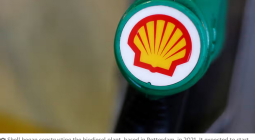Shell defeats landmark climate ruling ordering cut in carbon emissions
Oil and gas company had challenged 2021 ruling that it must reduce greenhouse gas emissions by 45% by 2030
Shell has won its appeal against a landmark climate judgment by a Dutch court, which in 2021 ordered the fossil fuel company to sharply reduce its greenhouse gas emissions.
A court of appeal ruled on Tuesday that, while Shell does have a “special responsibility” to cut its emissions as a big oil company, this would not be achieved by imposing a specific legal goal.
Shell had appealed against a lower court ruling in 2021 that it must cut its global carbon emissions by 45% by the end of 2030 compared with 2019 levels. It was the first such ruling against a company in the world.
Shell’s chief executive, Wael Sawan, welcomed the appeal decision, saying it was “the right one for the global energy transition, the Netherlands and our company”.
The case was brought by Milieudefensie, the Dutch arm of Friends of the Earth, and more than 17,000 co-plaintiffs.
“This hurts,” said the director of Milieudefensie, Donald Pols. “At the same time, we see that this case has ensured that major polluters are not immune and has further fuelled the debate about their responsibility in combating dangerous climate change. That is why we will continue to tackle major polluters, such as Shell.”
Shell was originally told it must slash emissions within its own operations, as well as those of its suppliers and buyers, in line with the Paris climate agreement.
During its appeal, Shell argued in court that corporate emissions were a matter for politicians, not the judiciary, and that any fossil fuels it chose not to extract would simply be exploited by another company.
The appeals court said Milieudefensie had the right to bring such a claim even though political choices must be made to combat dangerous climate change.
But it was not convinced that a reduction obligation imposed on a specific company would have the effect of limiting emissions from its customers, “especially if this reduction obligation can also be realised by selling less fossil fuels”.
Milieudefensie had accused Shell of failing to comply with the initial court ruling, which explicitly said the company should begin to act on the judgment immediately regardless of any appeal.
The NGO gave evidence to the court that, despite increasing its volume of renewables, Shell was also planning to develop hundreds of new oil and gas fields despite the International Energy Agency warning against investments in any new fossil fuel extraction.
The court said it was “reasonable to expect oil and gas companies to take into account the negative consequences of a further expansion of the supply of fossil fuels for the energy transition also when investing in the production of fossil fuels. Shell’s planned investments in new oil and gas fields may be at odds with this.”
However, it said this was not relevant to whether a specific reduction obligation should be imposed on the company.
Sawan said Shell still planned to halve emissions from its operations by 2030, adding: “We are making good progress in our strategy to deliver more value with less emissions.”
The court did uphold the statement that companies such as Shell had obligations to protect human rights.
The judgment can still be appealed against and taken to the supreme court. However, this would focus on interpretation of the law and not the key facts of the case.
Sjoukje van Oosterhout, head of research at Milieudefensie, said the NGO would read the full ruling carefully before deciding whether to appeal. But she said she believes there is still room for future legal action against corporations.
While this appeal was taking place, other domestic courts issued important rulings on assessment of greenhouse gas emissions from fossil fuel projects. In January 2024, Norway blocked the development of three North Sea oil and gas fields on the grounds that the state did not properly assess the impact of future use on climate breakdown. The UK supreme court issued a similar ruling several months later.
Cover photo: Winnie Oussoren and Donald Pols, of the NGO Milieudefensie, attend the court session in The Hague hearing Shell's appeal. Photograph: Yves Herman/Reuters






